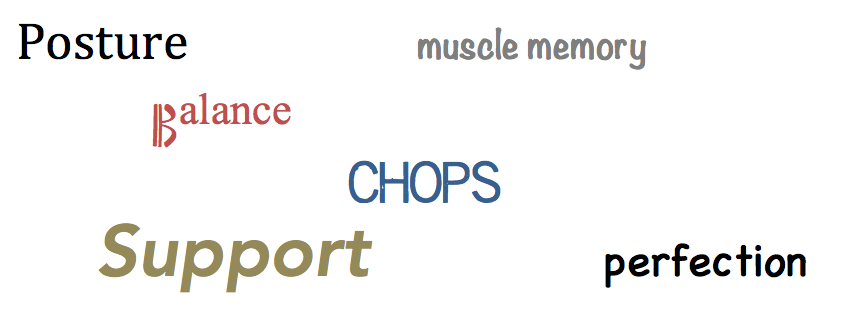One of the key things I take notice of when giving an Alexander Technique lesson to a musician for the first time, is the language my student is using to describe what they are doing when playing their instrument.
Words are necessary, of course, to help inform me about their needs, as well as to bring to light how precisely (or imprecisely) their thinking is impacting their playing.
I often encounter two sets of words as students begin to describe the perceived problem(s) that brought them to me for help:
One set of words describes what the student thinks she/he is doing while playing that is causing the problem(s).
The other set describes what the student would like to happen instead.
It is this second set of words in particular I’d like to address here, as trying to embody these words can sometimes bring about unintended (and unwanted!) consequences for the musician.
“How can that be?”, you might ask.
Well, the short answer is that the words may not accurately describe what the musician actually wants.
In fact, sometimes these words are counterproductive, in that they are describing an impossible event.
For example, when I hear a musician tell me she/he would like to be “completely relaxed” while playing, I feel compelled to gently call this into question.
For starters, if relaxed means “no muscular tension”, than that in itself would be impossible for two reasons:
First, we need a certain amount of muscle “tonus” (the constant low-level activity of a body tissue) just to function in the most essential way (breathe, maintain balance, etc.)
Second, muscular tension is actually necessary to play music. In fact, it would be impossible to play without it. (I won’t digress here on optimally directed, versus mis-directed muscular tension.)
And because we function as psychophysically whole beings (our thoughts condition our movements), being “relaxed” might also mean being in a state of attention that is too under-engaged to play music optimally.
So I must ask more questions of my student to find out more specifically what the word “relaxed” means.
Often it means simply working with a more optimally directed amount of muscular effort, while being calmly alert.
When I describe what I mean by being “calmly alert” (fully engaged and present in an activity, while being freely mobile and flexible in my body) , my student usually says something like, “Yes. That’s what I mean. That’s what I want!”
When a musician thinks “relaxed”, sometimes there is a “should” attached to it. Most specifically, “relaxed” should feel a certain way.
And if it doesn’t feel that certain way, something must be wrong. With that feeling of “wrong”, often misdirected effort and a divided attention follow (not to mention frustration)!
Here are a few more “loaded words”, as I call them, and some of the ways I modify them in my own thinking:
Instead of saying:
“Loose” (as in, “I want to be ‘loose’ when playing.”), I think instead of being “mobile” (as in, “I’m free to react constructively to my desires, and free to move in cooperation with my with my human design.”)
Instead of having “good posture” (which can encourage a rigid, immobile and uncomfortable way of being), I think instead of having “good use” (which means I’m neither collapsed, nor overly stiffened into uprightness, but moving easily in and out of balance in a dynamic and expansive way).
Instead of being “focused” (which implies a forced, narrow, reactive, divided and exclusive field of attention), I think instead of being “easily present” (which implies an easy, expansive, responsive, integrated and inclusive field of attention).
Instead of doing things “perfectly”, where pedagogy is concerned (which can lead to a rigid and inflexible approach that can stifle improvement), I think instead of doing things “optimally” (which allows room for inquiry and flexibility, and takes into account my human design, as well as my specific skill level and challenges; optimal is the best that can be done in the present moment, all things considered).
Instead of “my body”, where movement, posture and breathing are concerned (which can dis-coordinate my thoughts to my actions; as in “What am I doing with my body?”), I think instead of “myself” (which helps me to work in a holistic, constructive manner; as in “What am I doing with myself?”
And there are many more such loaded words…
So how do you use words when thinking about practicing/playing your instrument? Is it possible that just changing a few of these words can lead to a better experience, to even greater efficiency of effort?
It sure has been possible for me and my students.
Keep in mind that my words are not written in stone. These are words (thoughts, or “directions”, as we might call them in Alexander Technique lingo) that work best for me and for some of my students, and they change over time as understanding deepens and need dictates.
I’m constantly exploring and expanding how I speak to myself as I play music, as well as how my Alexander students think to themselves. It’s a work in progress. Just as it should be.
